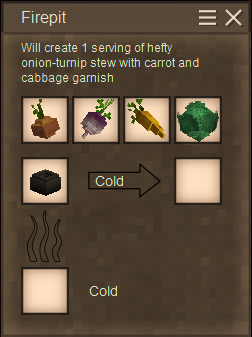Repas
Un repas, dans Vintage Story, est un objet de type nourriture consommable, élaboré en cuisant divers ingrédients dans une marmite.
Fabrication
All meals must be made in a cooking pot heated in a firepit. Meals can be made out of a mix of ingredients, but must be made according to specific recipes for the game to register them as valid meals. Certain recipes require ingredients to be placed in a specific order in the cooking pot as well. Recipes can be multiplied in order to make multiple servings at a time, up to a maximum of six servings.
If the contents of the cooking pot can be turned into a meal, the Firepit UI will list the name of the meal at the top, and an animation and sounds of a bubbling pot will play.
Types of meals
Every meal uses one or more types of ingredient as its basis, which must occupy certain slots in the cooking pot in order to register as a valid meal. These ingredient types include foods such as vegetables, mushrooms, meat or grain.
Meals are named after the ingredients used to produce them. The name format is generally in the following form:
(Hefty/Hearty) [Ingredient 1]-[Ingredient 2] [meal type] with [ingredient 3] and [ingredient 4] garnish/topping
Meals that have three different primary ingredients are called "hearty" meals, while meals with four different primary ingredients are called "hefty" meals. For example, a vegetable stew made with onion, turnip and carrot would be called "Hearty onion-turnip stew with carrot garnish", while a vegetable stew with onion, turnip, carrot and cabbage would be "Hefty onion-turnip stew with carrot and cabbage garnish". Honey, if added as an optional ingredient, is called a "topping".
The names are purely descriptive and have no additional impact on a meal's effects.
Usage
Once a meal is cooked it will be stored in the cooking pot. In order to actually eat the meal, players must place down the pot containing the meal on a block (leaving it on the firepit will also work) and use an equipped bowl on the cooking pot to fill the bowl with a single portion. The player can then eat that portion of the meal.
The satiety of a meal is the total satiety of all its ingredients. Once a player consumes a meal, it will halt satiety loss for a short time, meaning that the player needs to eat less food overall. Specifically, for every 100 satiety granted by meals, the hunger bar will stop increasing for 30 seconds.
Meals can also be placed into crocks to preserve them. To do so, equip the crock and use it on the cooking pot or bowl containing the meal. Preserved crocks can then be sealed with fat and placed in a cellar to further extend their shelf life.
History
- Before version 1.18.0, soybeans and peanuts could not be used as the primary ingredients of vegetable stew, only as an add-on.
- Until version 1.18.0 verify? the maximum serving size of all meals was four.
| Nourriture et Cuisine | |
|---|---|
| Obtenir la nourriture | Cueillette • Agriculture • Élevage • Cuisine |
| Ingrédients | Fruits • Légumes • Viandes • Céréales • Champignons • Miel • Fromage |
| Repas | Ragoût de légumes • Ragoût de viande • Soupe • Bouillie • Œufs brouillés • Pain • Tartes |
| Préservation des aliments | Marinade • Salaison • Confiture • Fromage • Alcool • Cellier |
| Outils | Foyer • Four en argile • Marmite • Meule |
| Utensiles | Bol • Pot • Jarre |
| Autres liens | Room • Satiété |
| Wiki Navigation | |
|---|---|
| Vintage Story | Guides • Foire aux questions (FAQ) • Vintage Story Original Soundtrack • Versions • Controls |
| Systèmes de jeu | Artisanat • Taille de pierre • Modelage d'argile • Forge • Cuisine • Température • Faim • Minage • Stabilité temporelle • Puissance mécanique • Commerce • Agriculture • Élevage |
| Le Monde | Création du monde • Biomes • Météo • Tempêtes temporelles |
| Objets | Outils • Armes • Armure • Vêtements • Sacs • Matériau • Nourriture |
| Blocs | Terrain • Plantes • Décoratifs • Éclairage • Fonctionnels • Minerai |
| Créatures | Entités hostiles • Animaux • PNJs • Joueurs |
| Miscellaneous | Liste des commandes client • Liste des commandes serveur • Mode Créatif : Guide de prise en main • Bot System • How_to_use_WorldEdit • Caméra cinématique • Enregistrement de vidéos à taux variable • ServerBlockTicking |

